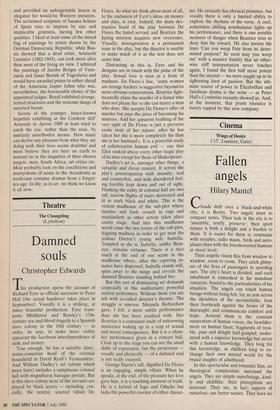Theatre
The Changeling (Lyttelton)
Damned souls
Christopher Edwards
his production opens the account of Richard Eyre as official successor to Peter Hall (the actual handover takes place in September). Visually it is a striking, at times beautiful production. Eyre trans- ports Middleton and Rowley's 17th- century sex-and-blood tragedy to a Spanish slave colony in the 19th century — in order, he says, to make more visibly apparent the Jacobean interdependence of rank and money.
True enough, he has a suitably slimy, status-conscious head of the colonial household in David Ryall's Vermandero. And William Dudley's set (about which more later) includes a sumptuous colonial hall with magnificent baroque portals. But in this slave colony most of the servants are played by black actors — including, cru- cially, the central, scarred villain De Flores. So what we think about most of all, to the exclusion of Eyre's ideas on money and class, is race. Indeed, the main des- tructive bond of the play between De Flores the hated servant and Beatrice the hating mistress acquires new overtones. Visually, miscegenation is a permanent issue in the play, but the director is unable to make much of it as the text does not assist him.
Distracting as this is, Eyre and his designer are in touch with the pulse of the play. Sexual love is seen as a form of madness. De Flores's line, 'some women are strange feeders' is suggestive beyond its more obvious connotations. Beatrice light- heartedly plans the murder of a fiancé who does not please her so she can marry a man who does. She accepts De Flores's offer of murder but pays the price of becoming his mistress. And her apparent loathing of the very sight of De Flores is just a perverse erotic twist of her nature: after he has taken her she is more completely his than she is her husband's. It is a powerful study of collaborative human evil — one that Eliot ranked above every other tragic play of its time except for those of Shakespeare. Dudley's set is, amongst other things, a versatile and clever conceit. It serves the play's preoccupation with insanity, real and counterfeit, and with disordered feel- ing forcibly kept down and out of sight. Flanking the richly lit colonial hall are two tall, narrow flights of stairs decorated and lit in stark black and white. This is the violent madhouse of the sub-plot where lunatics and fools crouch in rags and straitjackets as other action takes place centre stage. And into this madhouse world come the two lovers of the sub-plot, feigning madness in order to get near the jealous Doctor's young wife Isabella. Tempted as she is, Isabella, unlike Beat- rice, remains virtuous. There is a nice touch at the end of one scene in the madhouse where, after the capering in- mates have dispersed, Isabella stands still, spins away to the wings and reveals the damned Beatrice standing behind her. But this sort of dominating set demands (especially in this auditorium) powerful central performers. Without them you are left with so-called director's theatre. The struggle is uneven. Miranda Richardson gave, I felt, a more subtle performance than she has been credited with. Her Beatrice is a contained study of unknowing innocence waking up in a trap of sexual and moral consequences. But it is a cham- ber performance given in a concert hall. Close up to the stage you can see the small shifts of expression, but the projection — vocally and physically — of a damned soul is not really essayed.
George Harris's tall, dignified De Flores is an engaging, simple villain. When he speaks, at the end, of the pleasure her love gave him, it is a touching moment of truth. He is a hybrid of Iago and Othello but lacks the powerful essence of either charac- ter. He certainly has physical presence, but vocally there is only a limited ability to explore the rhythms of the verse. A cool, sometimes chilling nonchalance lights up his performance, and there is one notable moment of danger when Beatrice tries to deny him his reward. He also invests the lines 'Can you weep Fate from its deter- mined purpose? So soon may you weep me' with a massive finality that an other- wise stiff interpretation never touches again. I found the first half more potent than the second — we were caught up in its tightening knot of passion. But the ulti- mate source of power in Elizabethan and Jacobean drama is the verse — as Peter Hall's Cymbeline recently showed us. And, at the moment, that prime resource is barely tapped by this new company.














































 Previous page
Previous page